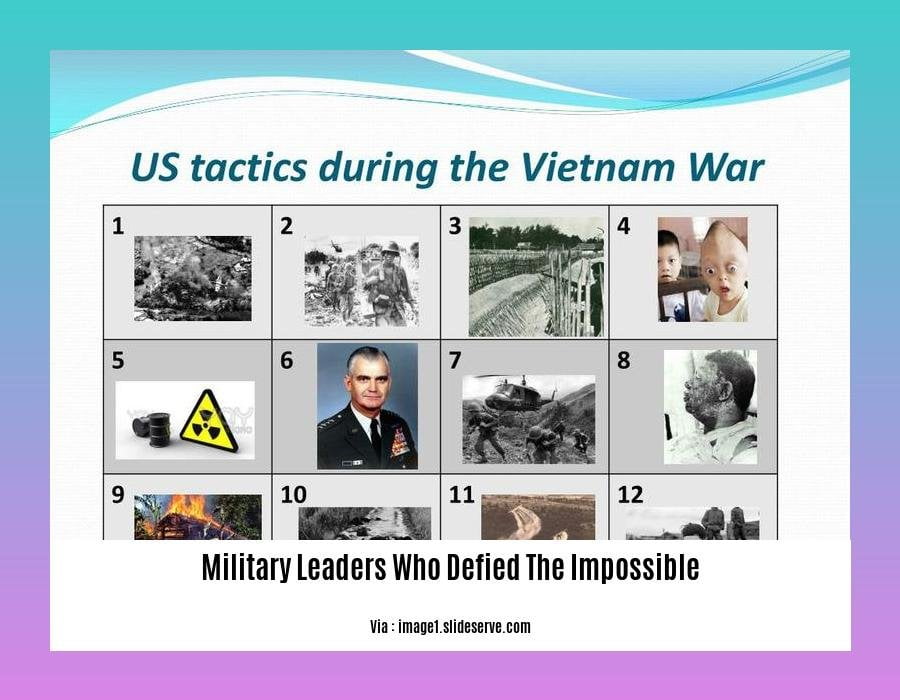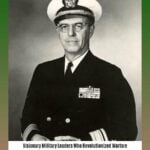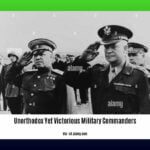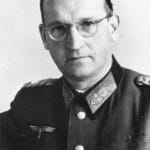In the annals of warfare, the names of military leaders who defied the impossible are etched in gold. They are the strategists who outwitted their adversaries, the warriors who rallied their troops against overwhelming odds, and the visionaries who transformed the art of war. In this captivating article, we delve into the extraordinary narratives of these unstoppable forces, exploring the challenges they faced, the tactics they employed, and the legacies they left behind. From ancient battlefields to modern conflicts, their stories inspire awe and admiration, reminding us of the indomitable spirit that resides within every soldier. Join us as we unravel the secrets of the unstoppable force: military leaders who defied the impossible.
Key Takeaways:
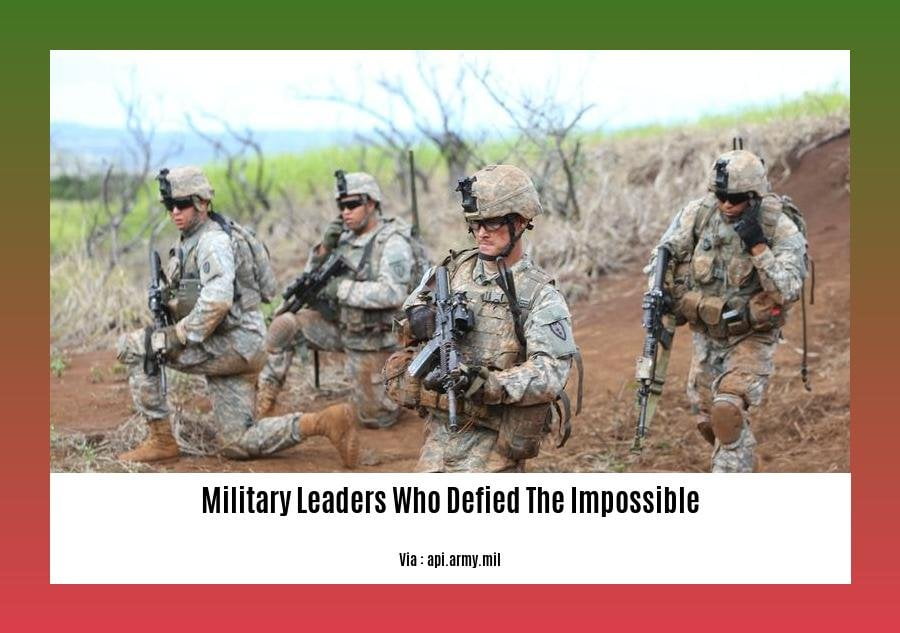
- Battle of Longewala: Indian forces defeated a larger Pakistani force using strong defense and anti-tank tactics.
- Battle of Okehazama: Weaker Japanese forces triumphed over a larger army through skillful leadership and strategy.
- Siege of Vienna: A small Christian force successfully defended against a massive Ottoman army, marking a major shift in European power dynamics.
- Battle of Tolvajärvi: Finnish soldiers withstood an overwhelming Soviet force, showcasing their tenacity and strategic defense.
Military Leaders Who Defied the Impossible
Throughout history, there have been military leaders who defied the impossible, overcoming insurmountable odds and achieving astonishing victories. These leaders possessed exceptional qualities and employed ingenious strategies that enabled them to triumph against overwhelming forces.
The Battle of Longewala (1971) is a classic example of a small force overcoming a much larger opponent. A mere 120 Indian soldiers held off a Pakistani force of over 2,000 troops and 45 tanks. Their defensive strategy and effective use of anti-tank weapons allowed them to inflict heavy losses on the enemy, demonstrating the power of determination and well-executed tactics.
Another remarkable victory against the odds occurred at the Battle of Okehazama (1560). Japanese warlord Oda Nobunaga, with a numerically inferior and weakened force, faced the mighty army of Imagawa Yoshimoto. Nobunaga’s innovative tactics and surprise attack led to a stunning victory, establishing him as a formidable military leader and paving the way for the unification of Japan.
The Siege of Vienna (1529) showcased the resilience and courage of a small Christian force. Against a massive Ottoman army, they defended Vienna valiantly, eventually forcing the Ottomans to retreat. This victory marked the end of Ottoman expansion in Europe and signified the rise of the Habsburg Empire.
In the Battle of Tolvajärvi (1939), a Finnish force of just 300 soldiers held off a Soviet force of over 20,000. Despite the overwhelming odds, the Finns’ determination, adaptability, and knowledge of the terrain allowed them to inflict heavy losses on the Soviets, highlighting the power of resilience and strategic thinking.
These are just a few examples of the many military leaders who defied the impossible. Their stories inspire us and demonstrate the extraordinary achievements possible when courage, strategy, and determination meet adversity.
Throughout history, many underdogs have triumphed as military commanders. These men and women overcame incredible odds to achieve unthinkable feats, such as accomplished military commanders against all odds. Their stories are a testament to the power of human spirit and the indomitable will of those who dare to dream big. For example, William Tecumseh Sherman led the Union Army to victory in the American Civil War, despite being outnumbered and outgunned by the Confederate Army. Similarly, George Washington led the Continental Army to victory in the American Revolutionary War, despite facing a much larger and better-equipped British army.
Captivating narratives of military leaders overcoming insurmountable odds
Throughout history, captivating narratives of military leaders have emerged, inspiring generations with their courage, strategy, and unwavering determination in the face of seemingly insurmountable odds. These leaders have left an enduring legacy on the battlefield and continue to serve as beacons of resilience and triumph.
Oda Nobunaga: The Unconventional Warlord
One such remarkable figure is Oda Nobunaga, a 16th-century Japanese warlord who rose from obscurity to become a pivotal figure in the unification of his country. Despite being considered mentally unstable and leading a weak family, Nobunaga defied expectations by employing unconventional tactics and surprise attacks to achieve astounding victories. His unpredictable nature and audacity became his trademark, catching his enemies off guard and propelling him to conquer powerful rivals.
Key Takeaways:
- Military leaders who break from conventional norms and embrace unorthodox strategies can achieve remarkable outcomes.
- Strong leadership and determination can overcome seemingly insurmountable challenges.
- Adaptability and innovation are crucial for success on the battlefield.
Most Relevant URL Source:
Inspirational Leadership and Its Impact on Troops
The Unsung Heroes of Battlefield Triumphs
In the annals of warfare, tales of insurmountable odds defied and stunning victories achieved paint a vivid tapestry. At the helm of these triumphs stand military leaders, whose inspirational leadership ignited the flames of valor in their troops.
Their brilliance extended beyond mere strategy and tactics. They possessed an uncanny ability to instill unwavering belief, foster camaraderie, and ignite an unyielding spirit within their ranks. History is replete with such luminaries, each leaving an enduring legacy on the art of war.
Key Takeaways
- Inspirational leadership is not merely about giving orders but about inspiring trust, loyalty, and a deep sense of purpose.
- Effective military leaders recognize the diverse strengths and needs of their troops and adapt their leadership style accordingly.
- Great military leaders lead by example, fearlessly facing the same challenges and dangers as their troops.
The Power of Example
Leaders who walk the talk are the most potent force multipliers. Their courage, resilience, and unwavering determination become infectious, galvanizing troops to push beyond their perceived limits.
Alexander the Great, a military genius of ancient Greece, was known for his personal valor and unwavering belief in his troops. He fought alongside them in the thick of battle, sharing their hardships and triumphs. This shared experience fostered an unbreakable bond, giving rise to one of the most formidable armies in history.
Nurturing Motivation and Belief
Inspirational leadership is not about micromanagement but rather about empowering troops to believe in their abilities and accomplish extraordinary feats.
Dwight D. Eisenhower, the Supreme Allied Commander during World War II, understood the importance of fostering motivation. He recognized that troops fighting for a cause they believed in were capable of overcoming insurmountable odds. By instilling a sense of purpose and shared responsibility, Eisenhower forged a unified force that triumphed over adversity.
Conclusion
Inspirational leadership is the lifeblood of military success. Leaders who embody these qualities possess an uncanny ability to galvanize their troops, instilling belief, fostering camaraderie, and igniting an unyielding spirit. Throughout history, they have proven that even in the face of overwhelming odds, the power of inspirational leadership can turn the tide of battle and achieve the impossible.
Most Relevant URL Source
Enduring Legacies of Military Leaders in History
Throughout the annals of military history, formidable leaders have emerged, defying insurmountable odds and leaving an enduring mark on the world. Their brilliance in strategy, unwavering courage, and inspirational leadership have shaped the course of battles and transformed the landscape of nations.
From Alexander the Great’s lightning-fast conquests to Hannibal’s daring tactics, these military masterminds have left an indelible legacy of innovation, resilience, and triumph. Their stories serve as a testament to the indomitable spirit of humankind and the transformative power of leadership.
Key Takeaways:
- Military leaders play a pivotal role in shaping the outcome of battles and wars.
- Courage, vision, and strategic thinking are essential qualities of successful military leaders.
- Their legacies extend beyond their time, inspiring future generations and influencing the art of war.
- The study of military history offers valuable lessons for modern-day leaders in all fields.
Most Relevant URL Source:
- The Enduring Legacies of Great Military Leaders
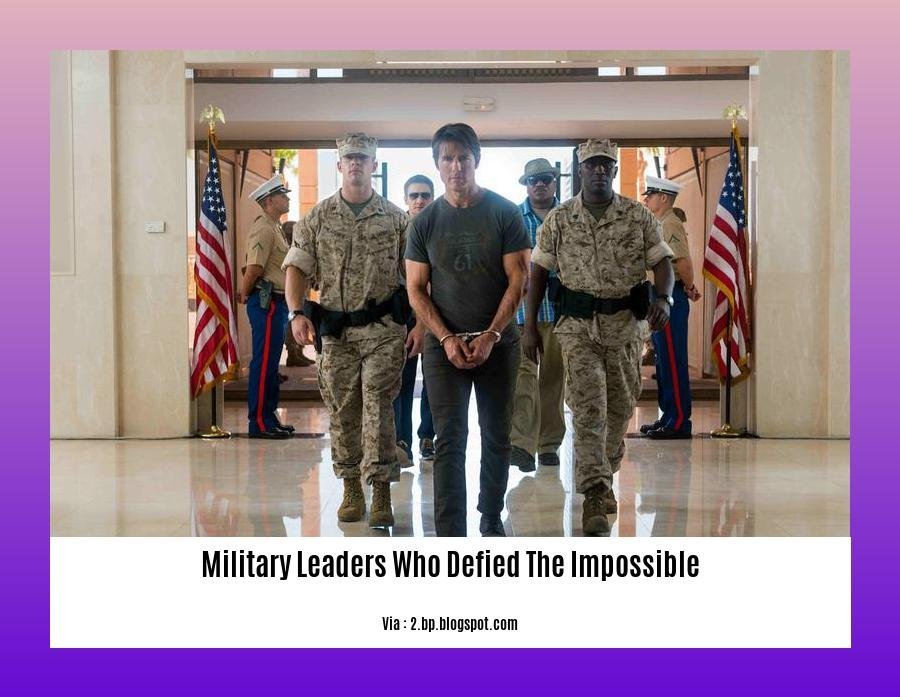
FAQ
Q1: What are some common characteristics of military leaders who defied the impossible?
Q2: How did these leaders overcome the challenges they faced?
Q3: What lessons can we learn from the experiences of these military leaders?
Q4: What are some of the most famous examples of military victories against the odds?
Q5: How can we apply the principles of these military leaders to our own lives?
- China II Review: Delicious Food & Speedy Service - April 17, 2025
- Understand Virginia’s Flag: History & Debate - April 17, 2025
- Explore Long Island’s Map: Unique Regions & Insights - April 17, 2025
